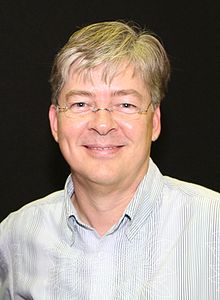Anders Hejlsberg
Anders Hejlsberg | |
|---|---|
 | |
| Born | December 1960 (age 63) |
| Nationality | Danish |
| Education | Technical University of Denmark[1] |
| Occupation(s) | Programmer, systems architect |
| Employer | Microsoft[1] |
| Known for | Programming languages Turbo Pascal, Delphi, C#[1] |
| Title | Technical Fellow[1] |
| Awards | 2001 Dr. Dobb's Excellence in Programming Award[1] |
Anders Hejlsberg (born December 1960)[2] is a prominent Danish software engineer who co-designed several popular and commercially successful programming languages and development tools. He was the original author of Turbo Pascal and the chief architect of Delphi. He currently works for Microsoft as the lead architect of C#[1] and core developer on TypeScript.
Early life
Hejlsberg was born in Copenhagen, Denmark, and studied engineering at the Technical University of Denmark but did not graduate.[3] While at the university in 1980, he began writing programs for the Nascom microcomputer, including a Pascal compiler which was initially marketed as the Blue Label Software Pascal for the Nascom-2. However, he soon rewrote it for CP/M and DOS, marketing it first as Compas Pascal and later as PolyPascal. Later the product was licensed to Borland, and integrated into an IDE to become the Turbo Pascal system. Turbo Pascal competed with PolyPascal. The compiler itself was largely inspired by the "Tiny Pascal" compiler in Niklaus Wirth's "Algorithms + Data Structures = Programs", one of the most influential computer science books of the time. Anders and his partners ran a computer store in Copenhagen and marketed accounting systems. Their company, PolyData, was the distributor for Microsoft products in Denmark which put them at odds with Borland. Philippe Kahn and Anders first met in 1986. For all those years, Niels Jensen, one of Borland's founders and its majority shareholder, had successfully handled the relationship between Borland and PolyData.[citation needed]
At Borland
In Borland's hands, Turbo Pascal became one of the most commercially successful Pascal compilers.[4] Hejlsberg remained with PolyData until the company came under financial stress, at which time, in 1989 he moved to California and became Chief Engineer at Borland. There he remained until 1996. During this time he developed Turbo Pascal further, and eventually became the chief architect for the team which produced the replacement for Turbo Pascal, Delphi.
At Microsoft

In 1996, Hejlsberg left Borland and joined Microsoft. One of his first achievements was the J++ programming language and the Windows Foundation Classes; he also became a Microsoft Distinguished Engineer and Technical Fellow. Since 2000, he has been the lead architect of the team developing the language C#. In 2012 Hejlsberg announced his new project TypeScript - a superset of JavaScript.
Awards
He received the 2001 Dr. Dobb's Excellence in Programming Award for his work on Turbo Pascal, Delphi, C# and the Microsoft .NET Framework.
Together with Shon Katzenberger, Scott Wiltamuth, Todd Proebsting, Erik Meijer, Peter Hallam and Peter Sollich, Anders was recently awarded a Technical Recognition Award for Outstanding Technical Achievement for their work on the C# language. A video about this is available at Microsoft Channel 9.[5]
Published work
- The C# Programming Language, 2nd Edition, Addison-Wesley Professional, ISBN 0-321-33443-4, June 9, 2006
- The C# Programming Language, 3rd Edition, Addison-Wesley Professional, ISBN 0-321-56299-2, October 18, 2008
- The C# Programming Language, 4th Edition, Addison-Wesley Professional, ISBN 0-321-74176-5, ISBN 978-0-321-74176-9, October 2010
References
- ^ a b c d e f "Anders Hejlsberg: Microsoft Technical Fellow". Microsoft. Archived from the original on 27 April 2009. Retrieved 2003-04-06.
{{cite web}}: Unknown parameter|deadurl=ignored (|url-status=suggested) (help) - ^ Hejlsberg states in a video at the Microsoft Museum that his birthdate is 1960, but most other sources say 1961. At TechEd 2006 in Barcelona, Anders confirmed his birthdate as December 1960
- ^ Hejlsberg states in this video that he never graduated
- ^ http://www.taoyue.com/tutorials/pascal/history.html
- ^ "Outstanding Technical Achievement: C# Team". Microsoft Developer Network: Channel 9. Microsoft. 6 April 2007. Archived from the original (video) on 26 April 2007. Retrieved 6 April 2007.
{{cite web}}: Unknown parameter|deadurl=ignored (|url-status=suggested) (help)
External links
- JavaWorld of 1997 writes how Hejlsberg went to Microsoft: Microsoft offered Anders Hejlsberg a signing bonus of US$500,000 and stock options. Microsoft doubled the bonus to US$1,000,000 after Borland made a counter-offer. Hejlsberg left Borland in October 1996.
Interviews
- Software engineering radio Episode 97: Interview Anders Hejlsberg
- Interview from .NET Developer's Journal, Vol 3 issue 2.
- The C# Design Process
- The Trouble with Checked Exceptions
- Delegates, Components and Simplexity
- Versioning, Virtual and Override
- Contracts and Interoperability
- Inappropriate Abstractions
- Generics in C#, Java and C++
- CLR Design Choices
- Microsoft's Hejlsberg touts .NET, C-Omega (now LINQ) technologies
- Deep Inside C#: An Interview with Microsoft Chief Architect Anders Hejlsberg
- C#: Yesterday, Today, and Tomorrow
- Video interview at channel9
- Computerworld Interview with Anders on C#
Videos
- Anders Hejlserg - Introducing TypeScript
- Life and Times of Anders Hejlsberg
- Anders Hejlsberg - Tour through computing industry history at the Microsoft Museum
- Anders Hejlsberg - What's so great about generics?
- Anders Hejlsberg - Programming data in C# 3.0
- Anders Hejlsberg - What brought about the birth of the CLR
- Anders Hejlsberg - The .NET Show: The .NET Framework
- Anders Hejlsberg - The .NET Show: Programming in C#
- Anders Hejlsberg - More C# Talk from C#'s Architect (Happy Birthday Video #3)
- Anders Hejlsberg - LINQ
- Anders Hejlsberg - Whiteboard with Anders Hejlsberg
- Anders Hejlsberg - LINQ and Functional Programming
- Outstanding Technical Achievement: C# Team
- Anders Hejlsberg - The Future of C#
- Anders Hejlsberg - The future of programming languages (JAOO Aarhus 2008)
- The Future of C# and Visual Basic (PDC 2010)
